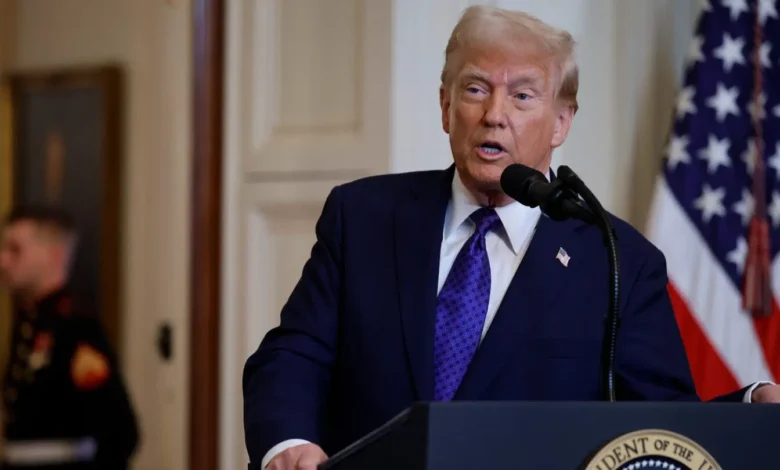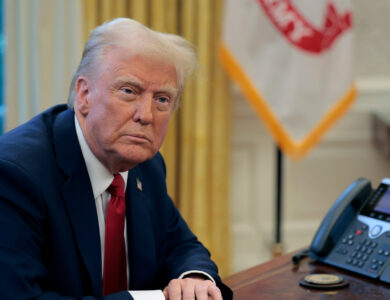Trump Files Emergency Immigration Appeal With Supreme Court

On Thursday, the Trump administration filed an emergency request with the U.S. Supreme Court to overturn a lower court ruling that blocked immigration enforcement stops in Southern California, which a federal judge claimed were indiscriminate and unconstitutional.
The appeal comes after the 9th U.S. Circuit Court of Appeals declined to lift the temporary restraining order. The Supreme Court will now determine whether to grant the administration emergency relief while the legal battle continues.
The Trump administration has been engaged in numerous legal battles as it works to implement Trump’s expansive legislative agenda, which has faced swift and widespread challenges in courts across the country.
The Associated Press reports that the administration has engaged in over 250 cases pertaining to Trump’s executive actions. Of those, 91 remain pending, 109 have been partially or fully blocked, and 74 are still in effect.
California has emerged as a leading opponent of the president’s immigration policies, culminating in a major confrontation between protesters and law enforcement in Los Angeles. The unrest led Trump to deploy the National Guard and U.S. Marines to restore order—over the objections of California Governor Gavin Newsom (D), the outlet added.
U.S. District Judge Maame E. Frimpong of the Central District of California, a Biden appointee, issued an injunction last week halting the Trump administration’s immigration stops and arrests in Southern California. In her ruling, Frimpong claimed there is a “mountain of evidence” indicating that the federal government’s enforcement tactics likely violated constitutional safeguards against unreasonable searches and seizures.
In its emergency appeal to the Supreme Court, the Trump administration argued that Judge Frimpong’s injunction poses a serious obstacle to the enforcement of federal immigration laws. The Justice Department claimed the ruling unfairly hampers the ability of federal agents to conduct lawful enforcement actions.
The 9th U.S. Circuit Court of Appeals sided with Frimpong, expressing skepticism over the government’s claim that the stops were reasonable and not covered by the injunction, Newsweek noted.
Government attorney Jacob Roth countered that Frimpong’s order was overly broad and argued there wasn’t enough evidence to prove that the administration’s enforcement practices constituted unconstitutional searches and seizures, the outlet continued.
“Legally, I think it’s appropriate to use the factors for reasonable suspicion,” Roth argued, in reference to race, language, presence at location, and occupation, all of which were listed in the temporary restraining order.
Trump administration officials strongly pushed back on the rulings.
“Unelected judges are undermining the will of the American people. President Trump and Secretary Noem are putting the American people first by removing illegal aliens who pose a threat to our communities,” Department of Homeland Security spokesperson Tricia McLaughlin said in a statement to The Associated Press.
“Sanctuary policies impede law enforcement and put American citizens at risk by design,” U.S. Attorney General Pam Bondi added.
“The Department of Justice will continue bringing litigation against sanctuary jurisdictions and work closely with the Department of Homeland Security to eradicate these harmful policies around the country,” she said.
Department of Homeland Security Secretary Kristi Noem also blasted the rulings.
“These sanctuary city politicians are endangering Americans and our law enforcement in order to protect violent criminal illegal aliens,” she said.
Newsweek reported that a hearing at the nation’s highest court for a preliminary injunction against the lower court rulings is scheduled for September.
Earlier this week, the Supreme Court declined to take up challenges of state and local lawsuits against oil companies that seek to compel them to pay billions for alleged climate change-related damages.
“Consumers are not helped by these cases, which seek to wipe products from store shelves and funnel money to left-wing causes,” said O.H. Skinner, executive director of the Alliance for Consumers, a consumer advocacy nonprofit.
“Here is hoping the targets of these lawsuits continue to fight these cases, as they have consistently prevailed in the final stages of review, and that is the only way for consumers not to be sacrificed before the left-wing onslaught here,” Skinner added.





